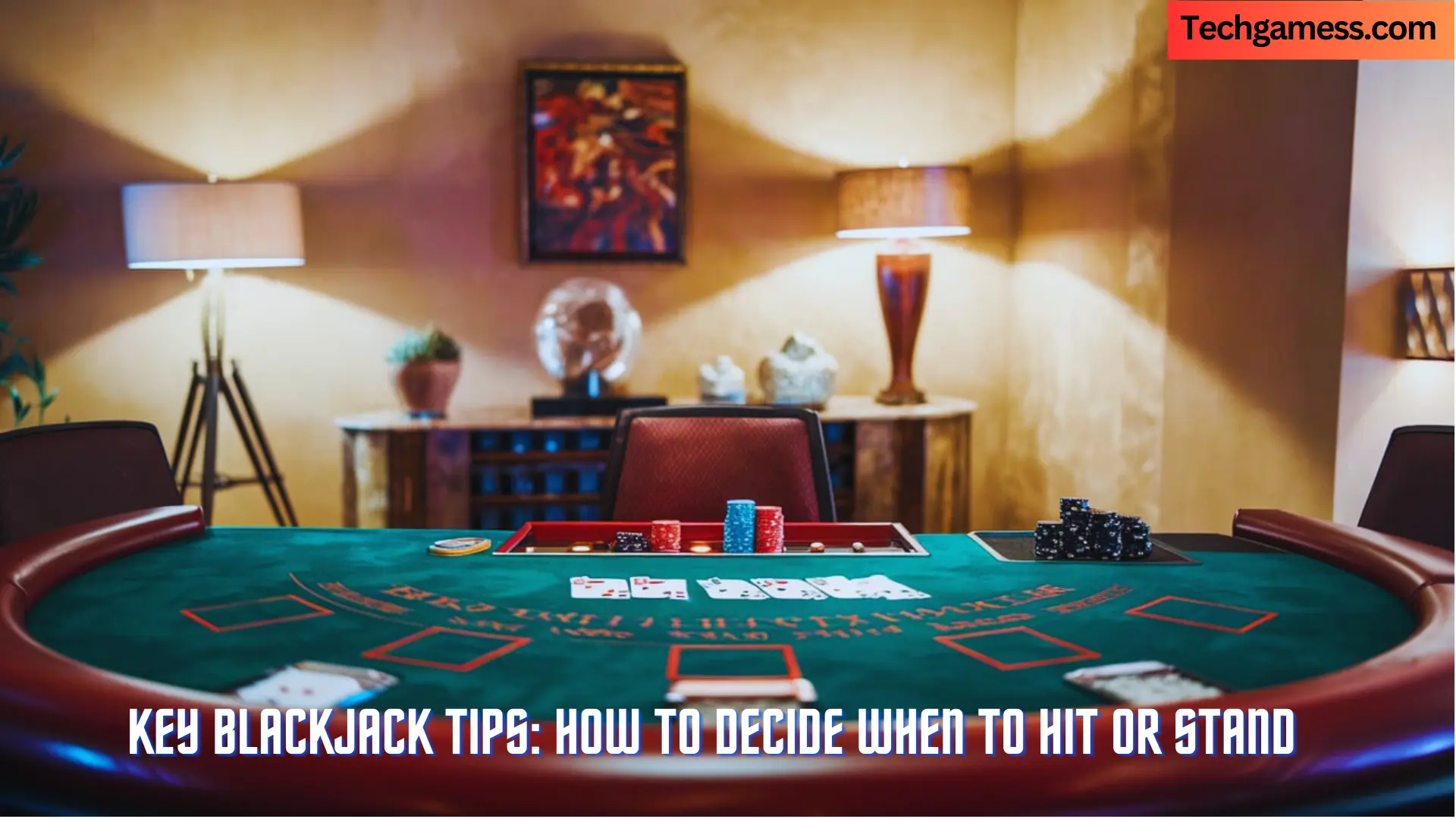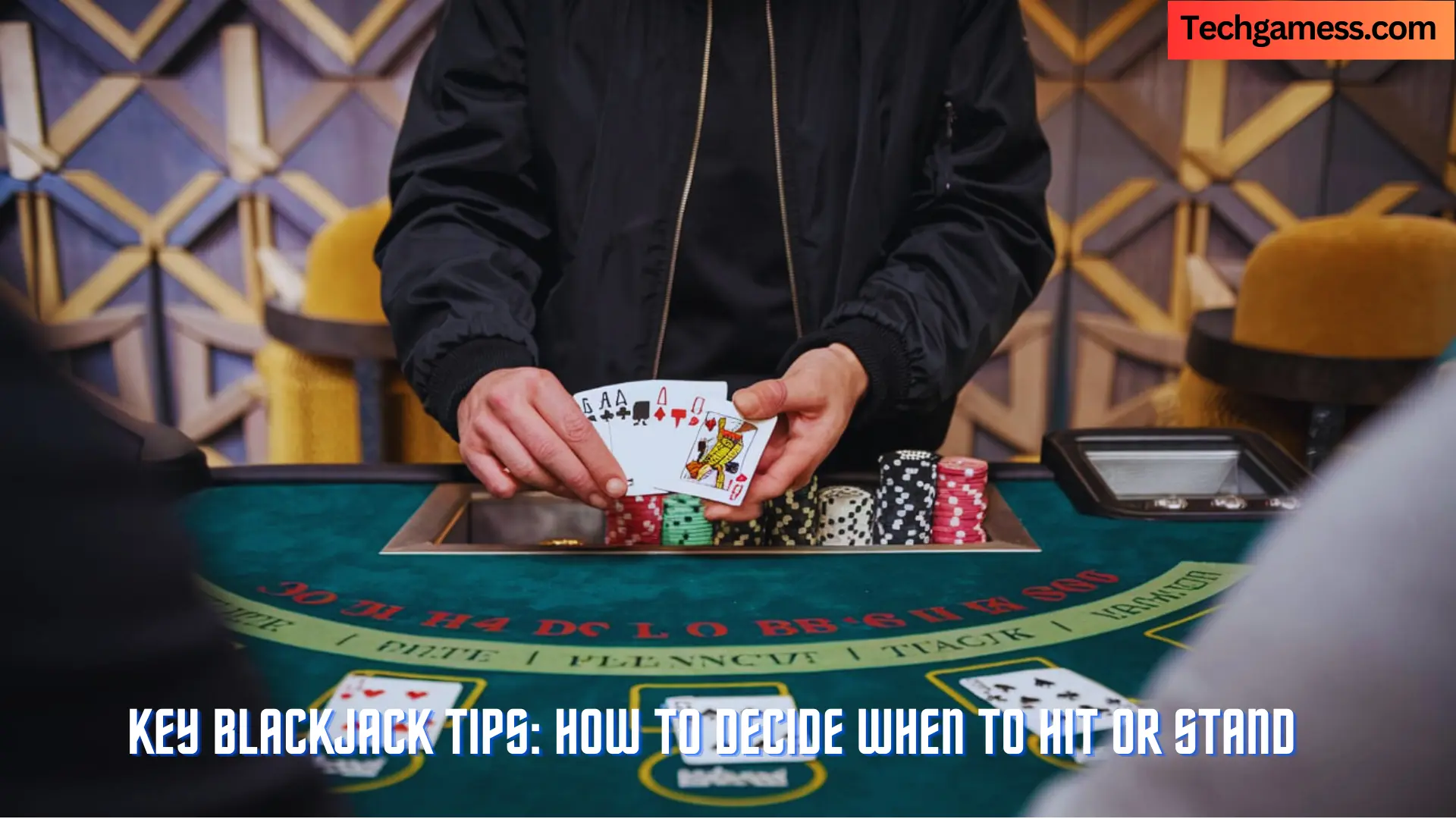Key Blackjack Tips: How to Decide When to Hit or Stand
In the live blackjack games, probably the most basic decision you make is when to hit and stand. This will seem easy enough to decide on at first, but the variations in this decision can significantly change the player’s chance of winning. Knowing how to be a hit-and-stand master will be well rewarded in terms of elevating your chances and knowing more about the game. In this article, we are going to discuss some of the key strategies for making the best decision each time you play live blackjack games.

Understanding the Basics of Hitting and Standing
Blackjack imparts two moves- hitting means getting another card in an effort to improve your hand and standing means maintaining your current hand and ending your turn. The basic blackjack gameplay is about trying not to get more than 21. Mastering the decision of when to hit or stand is crucial for successful gameplay in a casino setting. This strategic choice can significantly impact your odds of winning in blackjack and is essential for optimizing your play.
- Hit: If you think you get a better hand with the next card but won’t bust over 21, you hit.
- Stand: If your current hand is good enough to win, or if you suspect that hitting another card will make you go over 21, you stand.
Now, let’s walk into some tips from pros to help you decide what’s best to do when playing live blackjack online.
-
When to Stand
Knowing when to stay is part of any blackjack strategy. Sometimes it is wiser to stay, even with a hand that is not perfect but still pretty good. Here are some general guidelines:
- If the total of your hand is 17 or higher: If you have a stiff hand (no aces), and the total of your hand is 17 or higher, it is normally a good idea to stay. The chances of busting when getting the next card are too high.
- Soft 18 or better: Your hand is soft because it has an Ace which is counted as 11. This explanation is simpler and easier to follow. You ought to stand in most cases with a soft 18 or better except if the dealer’s upcard is a 9, 10, or an Ace. You might double down in such a scenario if you feel you have a chance to win.
- Weak Upcard by the Dealer: If the dealer’s upcard is a weak one, such as a 2, 3, 4, 5, or 6, it creates an incentive among most players to stand since such cards will likely bust the dealer.
-
Hit

Whenever your current total is low, you must hit to improve your hand. Here are some important situations that lead you to hit:
- If your hand is 8 or less: If the total is 8 or less, it usually pays to hit because there is very little possibility that you will bust, and you will likely get a better hand.
- If you are dealt a tough 12-16 and the dealer has a 7 or higher, you must stand back and wait for a better hand. This is because if you have 12-16 and the dealer is showing a strong card, that means anything 7 or better, you want to hit in order to improve your hand. The dealer has a good chance of completing with a strong hand, so you would need to have a stronger hand to compete.
- When you get a soft hand: If your hand counts an Ace as 11, like a soft 13, 14, 15, or 16, you’re generally in a more flexible position. Hitting is relatively safe since you can’t bust with one card and you may improve your hand significantly.
-
Consider the Upcard of the Dealer
The difference between hitting or standing makes all the difference with the dealer’s upcard. When blackjack casino games are particularly played in a live game, then one needs to create a close eye on what the dealer is showing on his upcard since this will give one an important clue about what kind of hand the dealer might have.
- Weak Dealer’s Cards (2-6): When the dealer shows a weak card, 2 through 6, the probability for the dealer to bust is higher. In that case, sometimes one wants to stand even with a weaker hand because the dealer’s chances of losing are higher.
- High-value dealer cards, such as 7, 8, 9, 10, or Ace, generally put the dealer in a strong position. When the dealer reveals one of these cards, the odds are often in their favor, making it more challenging for players to win the hand. You’re going to have to take more risks, possibly even hit a bad hand total, in an effort to beat a probable powerful hand on the dealer’s part.
-
Use a Basic Blackjack Strategy
The best way to choose when to hit and when to stand is by using the basic strategy of blackjack. This strategy is a result of statistical analysis based on the game and will tell you what you should do in every hand that can possibly occur. For example, the strategy might prescribe a stand on 17 or higher or hit a hard 12 if the dealer is showing a 7.
Many online gambling sites, live blackjack games included, have a basic strategy chart to guide one on the decision-making process in playing. Familiarize yourself with the strategic charts to raise your game, as well as boost the potential for you to emerge the winner.

-
Trust Your Instincts and Experience
Of course, the basic strategy is great, but then sometimes you need to just trust your instincts playing a live blackjack game. If you have been playing for some time and feel the game, sometimes you just need to deviate a little from the charts because of the overall experience.
For instance, if you feel the dealer is on a losing roll and may bust, you might choose to stand on a hand where you might have hit otherwise. The better you can read the game and adapt, the better your decisions will be.
Conclusion
Knowing when to hit and when to stand is the key to playing live blackjack games successfully. Using the following expert tips, you will know how to dominate their house edge. You might be using a basic strategy, taking into account the dealer’s up card, or relying on your intuition–the bottom line is that your primary focus should be directed at those moments in which you have a strategic choice: hit or stand.
FAQs about Blackjack Strategy
1. What does it mean to ‘hit’ in blackjack?
In blackjack, choosing to “hit” means you are requesting another card from the dealer to increase the total value of your hand. This is done in the hope of getting closer to a total of 21 without going over.
2. What does it mean to ‘stand’ in blackjack?
To “stand” means you are satisfied with your current hand and do not want any additional cards. This is usually done when you feel that your hand is strong enough to beat the dealer’s hand.
3. When should I hit in blackjack?
Generally, you should hit if your hand totals 8 or less, or if you have a soft hand (a hand that includes an Ace) and the total is less than 18. However, the strategy may vary based on the dealer’s face-up card.
4. When should I stand in blackjack?
It’s typically advisable to stand when your hand totals 17 or more, especially if the dealer has a lower card (like a 6 or below). The likelihood of the dealer busting is higher in these scenarios.
5. Is it better to hit or stand on a soft 17?
The decision to hit or stand on a soft 17 (Ace + 6) can depend on the dealer’s up-card. Some strategies suggest hitting if the dealer shows a strong card (like 9, 10, or Ace).
6. What is a hard hand vs. a soft hand in blackjack?
A hard hand is one without an Ace, or with an Ace that counts as 1 point. A soft hand includes an Ace that can be counted as either 1 or 11 without busting.
7. How do I use basic strategy charts for blackjack?
Basic strategy charts show the mathematically best moves for each possible hand against the dealer’s up-card. These charts can be used to optimize your decisions for hitting, standing, doubling down, or splitting.
8. Should I hit on 16 if the dealer has a high card?
If you have a hard 16 and the dealer’s up-card is a 7 or higher, it may be best to hit, even though it risks a bust, because the dealer has a strong chance of reaching a total of 17 or more.
9. What is the dealer’s advantage in blackjack?
The dealer has an advantage because players must act first. If you bust (go over 21), you lose automatically, even if the dealer also busts afterward.
10. Does counting cards help in deciding when to hit or stand?
Yes, card counting can help in determining when to hit or stand by giving you insight into the remaining cards in the deck. However, this strategy is usually only effective in games with multiple decks and requires practice.
These FAQs are designed to help players better understand the nuances of making strategic decisions in blackjack, improving their chances of winning.




I’m extremely inspired together with your writing talents
and also with the layout for your blog. Is that this a paid topic or did you modify
it your self? Either way stay up the nice high quality writing, it is rare
to look a great weblog like this one nowadays. Youtube Algorithm!
I am really impressed with your writing talents and also with the structure on your weblog. Is that this a paid theme or did you modify it your self? Either way stay up the nice quality writing, it is rare to see a great blog like this one nowadays!